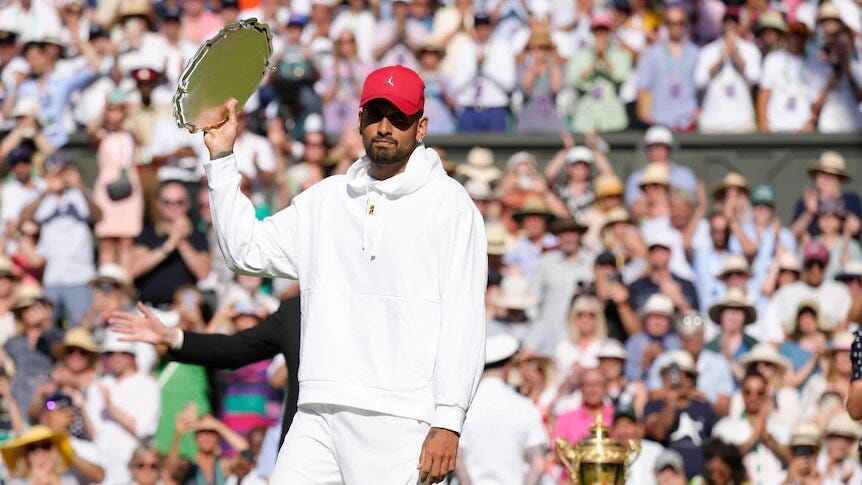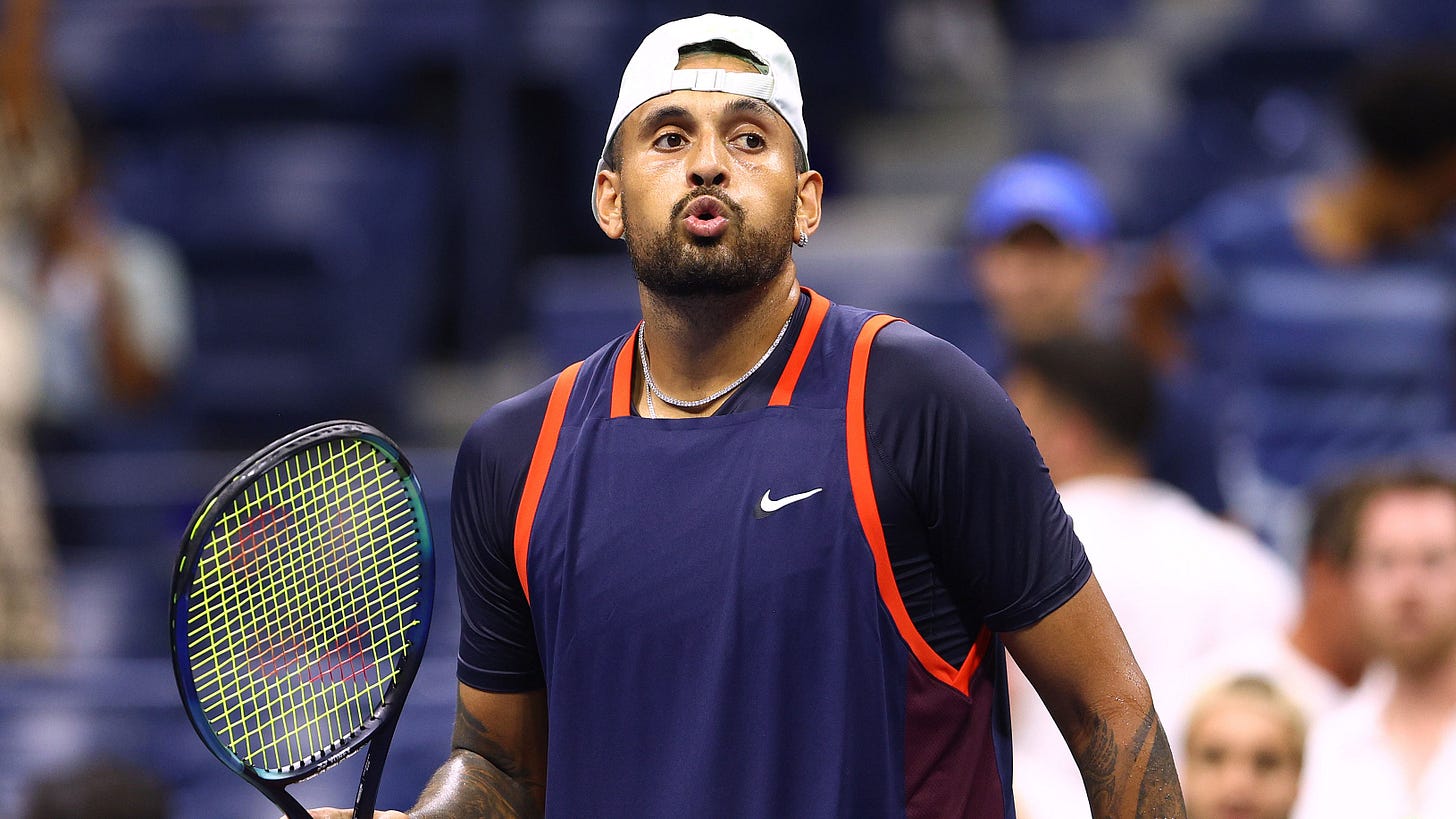Was Wimbledon just a detour for Nick Kyrgios or will it be the catalyst to change?
Kyrgios at the U.S. Open in Queens, New York, aiming for a first grand slam victory.
Nick Kyrgios could not resist adding some colour to Wimbledon’s closing ceremony, casually, or blatantly, slipping Mr. Knight’s (of Nike) coloured cap on, keeping him firmly on the periphery of the utterly staid aforementioned establishment. Presumably, just where he prefers it.
Similar to Augusta in golf, it seems Wimbledon treats its players with contempt.
SpeakingNick is a reader-supported publication. Both free and paid versions are available. The best way to support me and my work is by taking out a paid subscription now:
This article was tentatively started just after Kyrgios lost to Novak Djokovic in the men's singles final; it could be confidently argued that Djokovic defeated Kyrgios, with the champion having to call on all his resources to see off the combative Australian.
I intended to run the column as a prelude to the U.S. Open, which has just commenced, then I saw the draw and thought it best to wait to see if Kyrgios could get past his partner and friend, Thanasi Kokkinakis.
Kyrgios was abjectly apologetic when commenting on his first-round victory, "When we both saw the draw, it was a nightmare, honestly. We never want to play each other and he probably beats 80 percent of the draw tonight. He has been playing really good.”
Loyalty appears reciprocal to the Canberran. If you have Nick Kyrgios’ back, he has yours. If you’re not with him, then you are against him. It feels like there is very little middle ground, an absence of softness in his character and relationships.
Born from a mixed parentage, his father is Greek and his mother Malay, Kyrgios grew up in the planned environs of Canberra, the very word ‘planned’ fans in the face of his instincts. His peers describe him as talented, talented, and even more talented. The fate gods dealt him an impossible hand with their Canberra placement!. This might explain some of his resentment toward administration.
So, after a full month of deliberation, I decided to push on and try to finish what I started. With the cogitation set aside, and Kyrgios through to the third round, why not argue that the Wimbledon defeat could well be the catalyst for this sublimely artistic tennis player to shed the potential tag, and embrace the values of performance.
Thinking back to that Sunday afternoon in South-west London, many will remember Kyrgios screaming at the players box, and not the tennis. Both he, and Djokovic played out a thrilling final. It is important not to forget this.
Enjoying the read? I would love it if you shared it with your friends and colleagues ..
When the match ended, Nick Kyrgios immediately looked up at his box, and his shoulders slumped this after repeatedly asking them for more love–it seemed like no matter how much they cheered and applauded and praised and clapped, they could not offer enough love to sustain him. He was ‘all out of love’
It is hard to know what was swirling around his mind. Kyrgios spares nobody in defeat, especially himself, but, just maybe, he allowed himself to think, ‘That’s as good as I could give today, and it wasn’t good enough, my day will come another time, just as long as I play like this, and sustain my efforts like I did today.’ ‘I take my coloured cap off to you Novak Djokovic.’ ‘Wink, wink.’
Goran Ivanisevic, coach to Novak Djokovic, described Kyrgios as a “tennis genius” leaving Kyrgios to ponder if he belongs in the games upper echelons. His immediate reaction was affirmative. A conclusion reached of his own accord. Remember, Kyrgios chooses not to employ a coach.
He said afterwards, “I feel like my fire’s been lit this whole year (2022). I’ve obviously met a lot of amazing people this year who have just given me extra motivation,” he said.
“Amazing people.” How interesting it would be to pin Kyrgios down on who the people are?
The art of listening underpins both personal and professional development. I believe Kyrgios has always inherently listened but hasn’t been able to successfully decode all the information he receives, leading to hierarchical breakdowns with those looking to help him, namely coaches.
Kyrgios went on to say, “To find people that finally have my back, that I just love being around and they just want to push me to be a better person and to be a better tennis player, they realise that I’m immensely talented and I have a lot of, I feel like, a lot more to do in this sport.”
Fast forward to Queens, New York—the U.S. Open—a tournament removed from Wimbledon. Queens feels like an urban jungle with close to 2.5 million inhabitants, as opposed to Wimbledon, which resides in leafy South West London. Wise guys and Runyonesque characters fill the sidewalks of Queens, an environment much better suited to Kyrgios' instincts.
In drawing comparisons between sportspeople, the conspicuous parallel is the comparative skill levels and performance. Then you might look at their styles, techniques, and maybe last, character similarities. In the case of Nick Kyrgios, the obvious route is ‘character similarities’—because there are, or have been, very few tennis players who have displayed similar characteristic patterns.
Jumping off the page is John Patrick McEnroe. McEnroe was a showman—an incredibly smart one at that. Using his volatile court persona to unsettle his rivals, in particular—Jimmy Connors and Bjorn Borg—through the late seventies, and early eighties. His performances were littered with tantrums, invective, and “racket abuse”—saving his best for the 1990 Australian Open, where he was ejected from the tournament.
Does Kyrgios differ from McEnroe? I would say yes in part.
McEnroe had genuine rivals; Jimmy Connors, who could be equally abrasive, but amazingly seemed to be more readily accepted by administration and fans. And then Bjorn Borg, who was everything that McEnroe wasn’t in style, play, and character. Kyrgios, though, does not have a direct rival. It seems like everyone could be his rival. The opponent to fear most might be himself.
McEnroe graduated to the commentary box; he is a New Yorker, and the sidewalks hold no fears for a man easily cast in a Damon Runyon short story. His Alma mater is Stanford; the man is no dummy.
Kyrgios is no dummy either.
He could traverse the sidewalks of Queens and not be out of place—locals would welcome him as one of their own. He can stand opposite anyone in world tennis knowing his best is good enough. Kyrgios is a homebody too—he loves nothing more than returning to his roots. The previous version of Kyrgios was always impatient to get home to Australia—the newer version, we hope, has a greater sense of practicality, and a desire to stay the course.
As we speak, Nick Kyrgios is still in Queens, New York, after advancing to the third round with a four-set win today. I will bet Wimbledon wasn’t a detour. I believe it was the catalyst for change, a change that had been brewing for some time.
Kyrgios said of Djokovic after the Wimbledon final, “Yeah, he’s a bit of a god, I’m not going to lie, I thought I played well.”
And—hypothetically of course—Kyrgios said of himself after winning the 2022 U.S Open, “Yeah I’m pretty good, I’m not going to lie, I thought I played pretty well today.”
“Sometimes the road less travelled is less travelled for a reason.”
As always, my thanks for being here.







